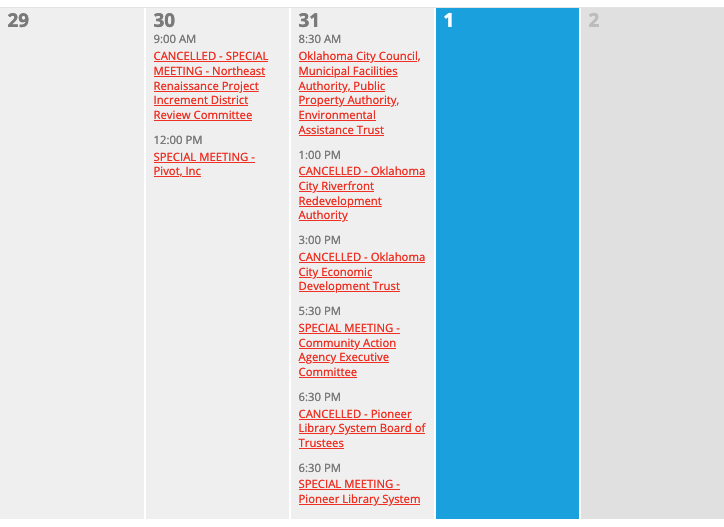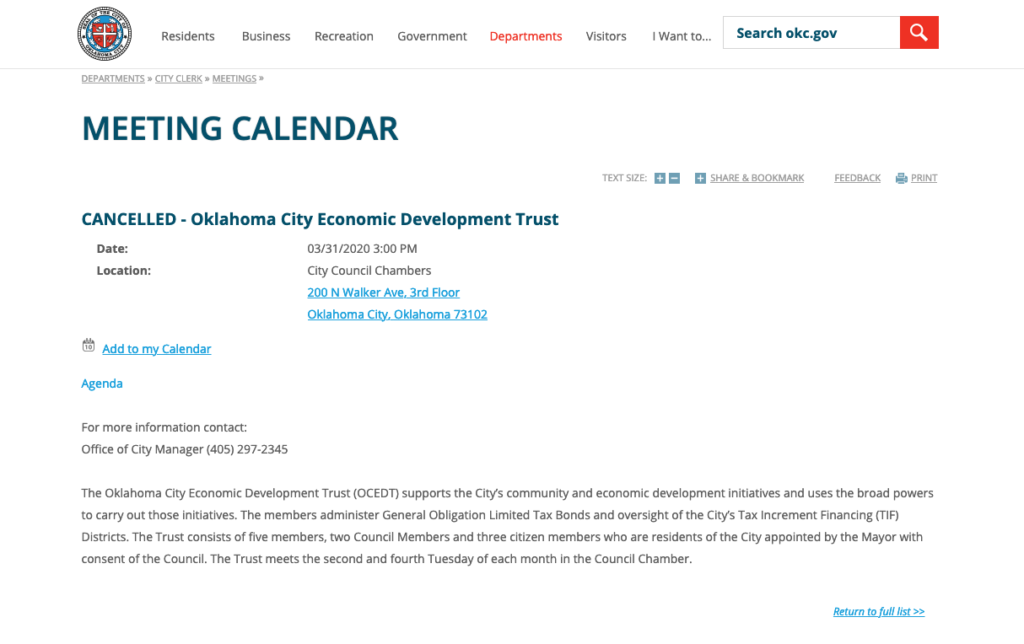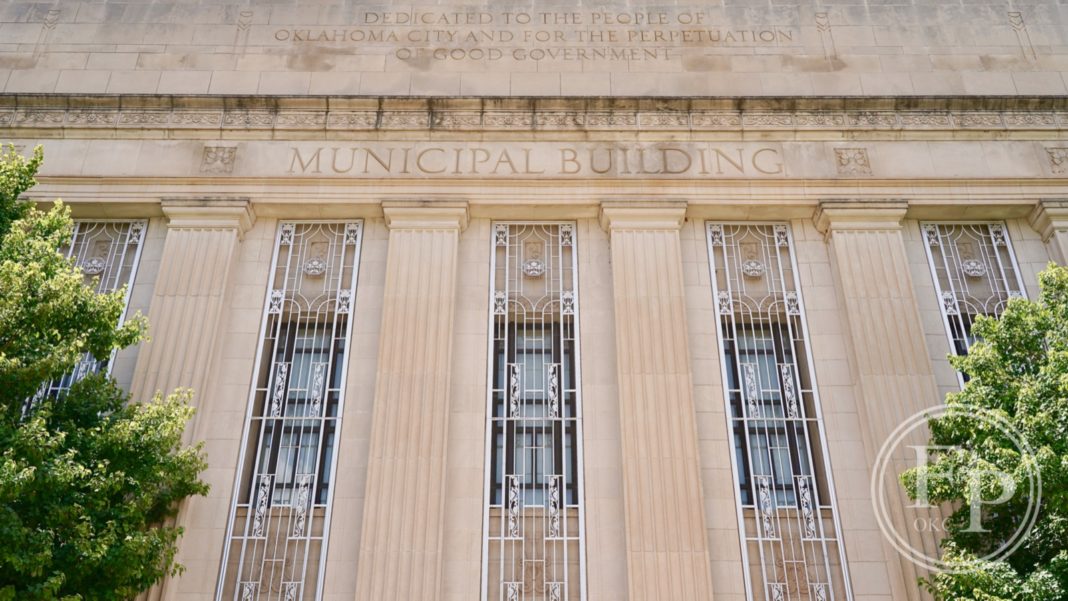Last Updated on April 7, 2020, 4:01 PM | Published: April 7, 2020
The Oklahoma City Economic Development Trust (OKCEDT) took action on $5.5 million in local economic aid, a land deal, and TIF spending Tuesday, March 31 in a meeting that was listed as “canceled” on public notices.
Because of problems with the notice, serious questions remain about the legitimacy of the meeting.
City officials claim that the meeting was a special meeting and the notices being marked “canceled” were a mistake by a city staff member.
But no notice of a special meeting was on any part of the public notices or even the agenda for the meeting.
An audio recording of the teleconferenced meeting shows there were no public comments or questions phoned in. Was it because the public thought it had been canceled?
And, according to a recognized authority on the Oklahoma Open Meeting Act, the meeting was “a major violation.”
Avoiding a lawsuit
Joey Senat is an associate professor at Oklahoma State University and the author of two books on open records and open meetings in Oklahoma.
Senat told Free Press in a phone call that the City is at risk of a lawsuit later because the public was not given adequate notice and especially when such expensive business was being conducted with public money.
“I think the smart thing to do would be to call a special meeting and do this all over again,” said Senat about the meeting.
The biggest worry for the City would be a lawsuit at a later date that would require the City to unwind many more actions that take place after this initial meeting where the public did not receive adequate notice.
“Anybody can sue over an Open Meeting Act violation,” Senat told us. “It doesn’t have to be somebody who was harmed by the violation, doesn’t have to be somebody that lives in Oklahoma City. It could be anybody who can sue because it’s to benefit all of us — the entire public.”
“And, when they have that [meeting], it’s not a matter of just coming through and voting,” Senat added. “They should have the discussion again and talk through what they did the first time when the public didn’t know it was going on.”
Meeting notice
According to Kristy Yager with the City, the problem with notice to the public was because of the “chaos” of shifting City meetings to teleconferencing.
“The City Clerk’s office was challenged to make accommodations quickly that would allow public meetings to be held over teleconference while complying with changes to the open meetings act related to COVID-19,” wrote Yager in response to our inquiry.
“A teleconference meeting is considered a change of location,” Yager wrote. “The EDT couldn’t meet the 10-day notification, so they had to cancel their regular and call a special meeting. Unfortunately, in the chaos, an employee the Clerk’s Office forgot to remove the canceled meeting on the on-line calendar.”
“Being confused and in chaos is not an excuse for violating the Open Meeting Act,” Senat countered.
No special meeting
The words “special meeting” were not on the public-facing notices or on the agenda packet used in the meeting.
The public is supposed to receive 48 hours notice before a special meeting is held. No such notice was given.
The only public notices of the meeting listed it as a regular meeting that was “canceled.”


And no mention of a special meeting can be heard on the audio of the teleconference at any point.
In contrast, two other items on the meetings calendar of the City for that same day showed that meetings of the Community Action Agency Executive Committee and the Pioneer Library System were clearly marked “Special meeting” both on the city calendar, the calendar item, and the official agenda.
Millions
OKCEDT voted for a joint resolution the City of Oklahoma City Council had passed earlier in the day for $5.5 million to aid local businesses hit hard by the economic downturn of the COVID-19 pandemic.
To learn more: OKC City Council votes $5.5M aid to City small businesses
The OKCEDT is chaired by Larry McAtee, Ward 2 City Councilman. Rhonda Hooper is the Vice-Chairperson. Members are Jim Roth, Todd Stone, and Lynn Pickens (not attending this meeting).
The complex joint resolution directs City Manager Craig Freeman, who is the General Manager of the Trust, and Catherine (Cathy) O’Connor who is the surrogate general manager of the Trust, to develop the various programs and see that the money is distributed to needy businesses in the Oklahoma City limits.
O’Connor is not a City official but is the President and CEO of the private company Alliance for Economic Development, formed in 2011 to be a go-between in negotiations between the City and developers on MAPS projects and other economic developments.
Land and projects
Other business taken up in the meeting included the transfer of land to the Central Oklahoma Transportation and Parking Authority (COTPA) for the new Convention Center parking garage.
Also, the Trust approved a memorandum of agreement (MOU) for the Marcus Garvey Economic Development Project for TIF money.
The Trust approved an MOU with the Myriad Gardens Crystal Bridge Project for allocation of TIF money for renovations to the Crystal Bridge.
Founder, publisher, and editor of Oklahoma City Free Press. Brett continues to contribute reports and photography to this site as he runs the business.









